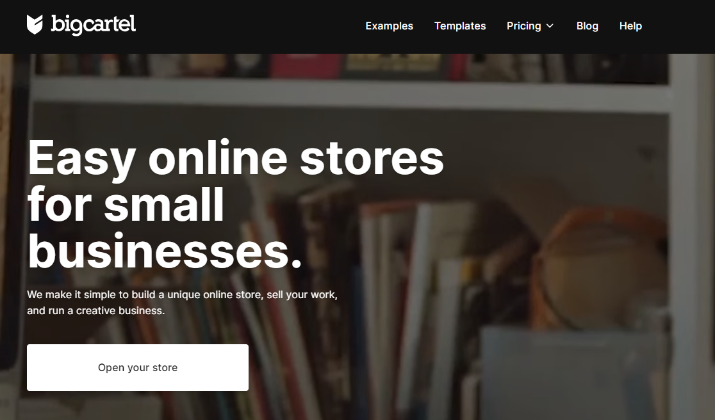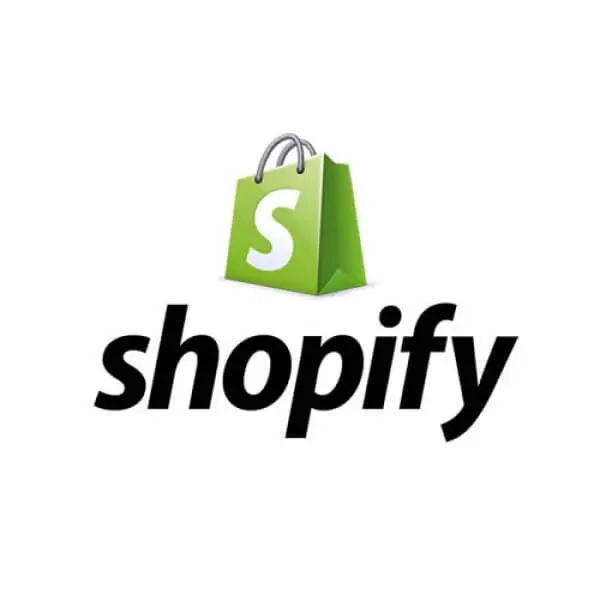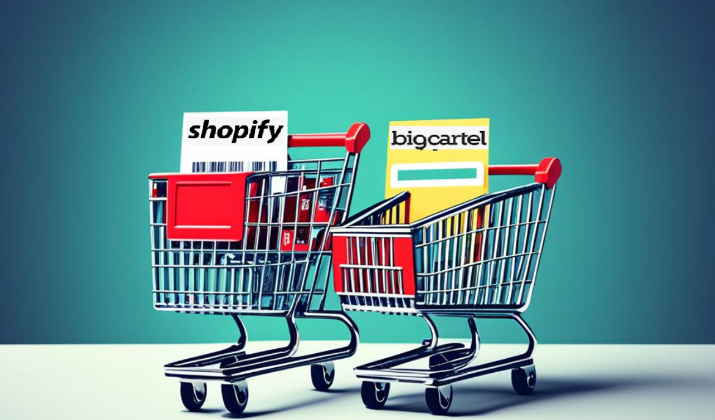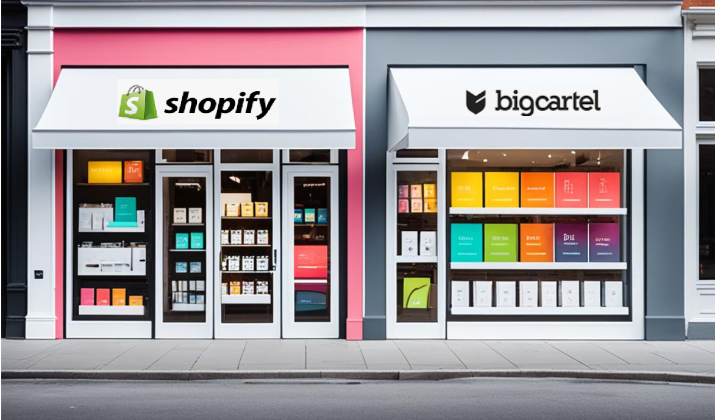With so many options available, it can be overwhelming to choose the right online store platform for your ecommerce business.
Today, we will review the features of two popular platforms – Big Cartel and Shopify.
Big Cartel is a user-friendly ecommerce platform designed specifically for small businesses and creatives to easily sell their original work online.
Let’s begin.
What is Big Cartel?

Big Cartel is an ecommerce platform that caters to creative and artistic sellers, offering a simple and user-friendly approach to building online stores.
Here are its key features:
- Templates: It provides 19 diverse themes for design customization, allowing users to create visually appealing online stores without the need for coding skills.
- Ecommerce Features: Big Cartel offers basic marketing tools like discounts and promo codes, SSL encryption for security, and order management features such as confirmation emails and tracking.
- SEO and Security: Big Cartel optimizes pages for SEO and provides SSL certificates for secure transactions. However, it lacks advanced SEO features and detailed information on hosting security.
- Inventory Management: Paid plans offer inventory tracking and low stock notifications to help manage your product inventory.
- Analytics: Paid plans allow integrating Google Analytics to track store performance metrics like orders, visitors, and conversion rates.
- Security: All Big Cartel stores come with SSL encryption, regardless of plan.
- Order Management: Users can send order confirmation emails, track orders, and bulk export order history.
Big Cartel is best suited for those with a small inventory looking for a cost-effective and straightforward ecommerce solution, especially if they prioritize simplicity and aesthetic appeal in their online store design.
Also read: Whop vs Shopify
Getting to Know Shopify
Here are the main features of this platform:
- Shopify offers free and paid themes from the Theme Store to create a unique and visually appealing store.
- The intuitive website builder allows you to customize your store with an easy drag-and-drop interface.
- Shopify supports multiple languages and currencies, enabling you to sell globally.
- You can easily add products with descriptions, images, and attributes in the Shopify backend.
- Shopify helps manage orders, customers, and inventory all in one place.
- It offers automated email reminders for abandoned carts and order tracking.
- With Shopify, you can sell on your online store, social media, online marketplaces, and in-person with Shopify POS.
With its user-friendly interface, powerful features, and scalability, Shopify makes it easy for businesses of all sizes to start, run, and grow an online store.
Check out: StoreFunnels vs Shopify
Try Shopify free followed by first month at just $1. No credit card required. Limited Time Offer.
Ease of Use & Web Design
Let’s take a look at what these platforms offer when it comes to ease-of-use and store design.
1. Ease of Use
- Big Cartel is slightly easier to use overall, with a simpler interface and fewer features to learn. It has helpful prompts and an easy-to-follow setup wizard.
- Shopify has a more complex dashboard and requires more time to set up an online store, but its platform is very intuitive even with the extensive features.
2. Themes
- Shopify provides a wide range of themes, both free and premium, that can be customized to create attractive and professional-looking websites.
- Big Cartel provides 16 free, mobile-optimized themes but they are less sophisticated and not as customizable.
3. Theme Customization
- Shopify themes allow editing of both mobile and desktop versions.
- Big Cartel themes are mobile-optimized but cannot be edited for mobile.
4. Design
- Shopify features advanced design capabilities such as product image zoom, customer logins and product videos.
- Big Cartel lacks these key design features available in Shopify.
While Big Cartel is slightly easier to use, Shopify is the superior choice for design with its large selection of professional, mobile-friendly themes and greater customization options.
However, Big Cartel’s simpler interface and free themes may be preferable for beginners or those with very basic design needs.
Explore: SamCart vs Stripe
Product Management & Inventory Size
Both Big Cartel and Shopify offer features to help you effectively manage your products, but there are some differences to consider.
1. Inventory Size
- With Big Cartel, you can sell up to 500 products, making it suitable for small online stores with a limited product catalog. This can be beneficial if you have a curated selection of items or if you’re just starting out.
- Shopify allows you to sell an unlimited number of products, providing scalability for businesses with larger inventories.
2. Support for physical/digital products
- Both Big Cartel and Shopify support physical products, allowing you to list and sell tangible goods.
- Shopify offers additional options to accommodate your needs if you’re looking to sell digital products such as e-books, music, or software downloads.
3. Product Management
- Shopify offers features to handle larger product catalogs and track inventory levels in real-time. This allows you to efficiently manage your stock, avoid overselling, and provide accurate information to your customers.
- Big Cartel, while functional, may be more suitable for smaller inventory sizes due to its simpler inventory management features.
When it comes to inventory size and product management, Shopify takes the lead with its more advanced tools. However, if you’re a beginner or have a small online store with limited customization needs, Big Cartel may be the right choice for you.
Read this too: Shopify vs GoHigh Level
Try Shopify free followed by first month at just $1. No credit card required. Limited Time Offer.
Dropshipping & Fulfillment
Both Big Cartel and Shopify offer options for seamless order fulfillment and shipment tracking. However, there are some key differences as well. Take a look.
1. Dropshipping Options
- Shopify is the clear winner, offering integrations with hundreds of dropshipping suppliers via its app store.
- Big Cartel has more limited dropshipping options, primarily through integrations with Printful and The Art of Where for print-on-demand products.
2. Inventory and order management
- Shopify provides more advanced and comprehensive inventory and order management tools. Users can track stock levels, receive stock notifications, and efficiently manage orders.
- Big Cartel’s inventory management features are more basic but sufficient for small stores.
3. Shipping features
- Shopify’s shipping features are more robust, offering discounts, easy management of rates, bulk printing of labels, and automatic carrier-calculated shipping rates for advanced plan subscribers.
- Big Cartel integrates with third-party shipping apps but lacks built-in shipping services.
While Big Cartel is a good fit for artists and small businesses selling limited, unique products, Shopify is the better choice for serious online sellers looking to scale their business.
Also read: Shopify vs Odoo
Payment Integration & Transaction Fees
When it comes to payment processing for your online store, both Big Cartel and Shopify offer convenient options.
1. Payment Integration
- Big Cartel utilizes non-integrated payment processors like Stripe or PayPal, requiring users to manage a separate payment processor and adhere to its credit card processing fees.
- Shopify offers a fully integrated solution through Shopify Payments, allowing users to manage payment data alongside other store analytics within a single platform. Shopify Payments eliminates transaction fees, providing a seamless payment processing experience.
2. Payment Gateways
- Shopify integrates with over 100 payment gateways worldwide, offering a wide range of payment options for users, including major providers like 2Checkout, Adyen, and Authorize.net.
- Big Cartel, on the other hand, only offers two payment choices: Stripe or PayPal, with users needing to create accounts with these third-party providers to start accepting payments.
3. Transaction Fees
- Big Cartel does not charge transaction fees directly but users will only pay the fees charged by their chosen payment processor, such as Stripe or PayPal.
- Shopify charges transaction fees based on the plan chosen. For example, with the Shopify Basic plan, transaction fees start at 2.9% plus 30 cents per transaction for online payments.
Big Cartel offers simplicity and no direct transaction fees, whereas Shopify provides a more integrated payment processing system with a wider range of payment options and competitive transaction fees, making it a more comprehensive solution for ecommerce businesses.
Check out: Webflow Ecommerce vs Shopify
SEO & Marketing Tools
Big Cartel and Shopify offer valuable SEO tools to help you improve your website’s visibility and attract more organic traffic. However, there are notable differences as well.
Let’s take a look.
1. SEO Tools
- Shopify has stronger SEO tools than Big Cartel. It allows you to set titles, descriptions, featured images, breadcrumbs, and URLs on your site and product pages.
- Big Cartel lacks advanced SEO features. You cannot set meta descriptions for pages, edit URLs once set up, or make other SEO optimizations.
2. Blogging
- Shopify has a built-in blogging feature, while Big Cartel does not.
- Shopify allows you to add SEO excerpts to each blog post to improve search rankings.
3. Marketing Tools
- Shopify offers more advanced marketing features, including abandoned cart recovery, discount codes, gift cards, and customer segmentation.
- Big Cartel has basic built-in site analytics, but lacks the sophisticated marketing tools available on Shopify.
Shopify is the clear winner when it comes to SEO and marketing capabilities. The SEO toolkit, blogging features, and robust marketing tools make it a better choice for serious online sellers looking to drive traffic and sales through search and digital marketing.
Explore: Sellfy vs Redbubble
Try Shopify free followed by first month at just $1. No credit card required. Limited Time Offer.
Customer Support & Resources
Here’s a closer look at the customer support options and resources offered by Big Cartel and Shopify.
Customer Support
- Shopify offers extensive 24/7 customer support via live chat, email, and phone, ensuring accessibility for users.
- Big Cartel provides more limited support, mainly through email during standard business hours.
Online Resources
- Shopify has a comprehensive help section equipped with a wealth of resources, including articles, guides, and access to community forums, all designed to support Shopify store owners effectively.
- Big Cartel’s online resources are more limited compared to Shopify’s extensive support materials.
The commitment to support is a standout feature that differentiates Shopify from other ecommerce platforms. Big Cartel, while still providing helpful support, falls short in comparison to Shopify’s extensive resources and 24/7 accessibility.
Read this too: ThriveCart vs SamCart
Migration to Shopify
If you find yourself in the position of wanting to migrate from Big Cartel to Shopify, these tips will be handy.
1. Ease of Migration
- Migrating from Big Cartel to Shopify is relatively straightforward, with several options available.
- You can use the built-in Big Cartel Export Tool to download your data as a CSV file, which can then be imported into Shopify.
- Alternatively, you can use third-party migration services like Cart2Cart to automate the process of transferring your store data from Big Cartel to Shopify.
2. Data Transfer
- When migrating from Big Cartel to Shopify, you can transfer key data like products, orders, customers, and content.
- However, the migration process may be limited to standard data fields, and transferring custom data or data created by third-party apps may require additional work.
3. Scalability
- One of the main reasons to switch from Big Cartel to Shopify is the platform’s superior scalability.
- As your business grows, Shopify can easily accommodate increased traffic, orders, and product offerings.
- Big Cartel has limitations in terms of the number of products you can sell and the amount of traffic your store can handle.
Also read: Shopify vs WooCommerce
Try Shopify free followed by first month at just $1. No credit card required. Limited Time Offer.
Conclusion
For beginners and small stores with limited customization needs, Big Cartel is a suitable option.
However, if you’re looking for a more robust platform with advanced features, scalability, and a wide range of integrations, Shopify is the better choice.
Shopify’s scalability and robust feature set make it a more attractive option for businesses looking to grow and expand their operations.
Ultimately, the best online store platform between Big Cartel and Shopify depends on what you prioritize.















